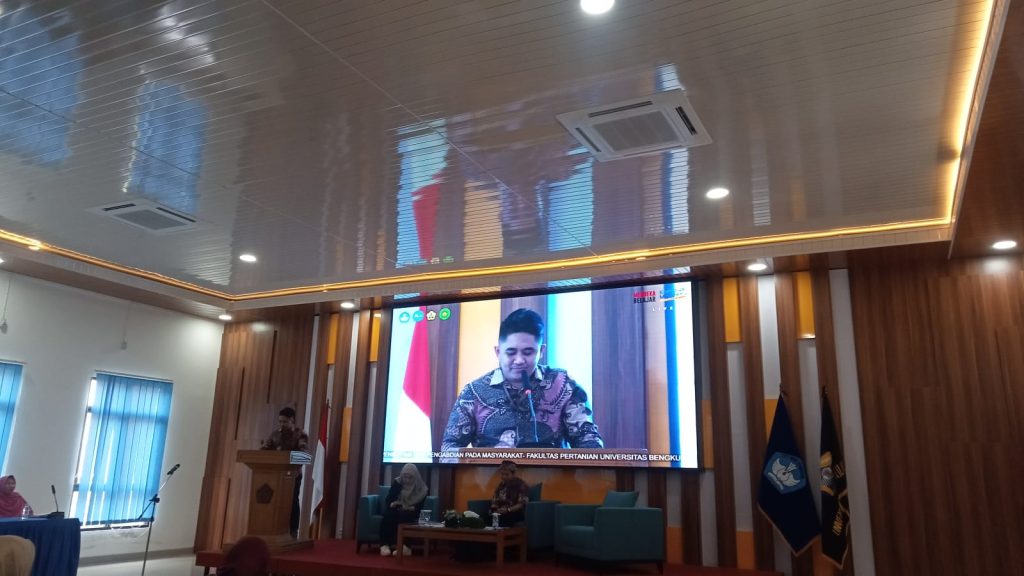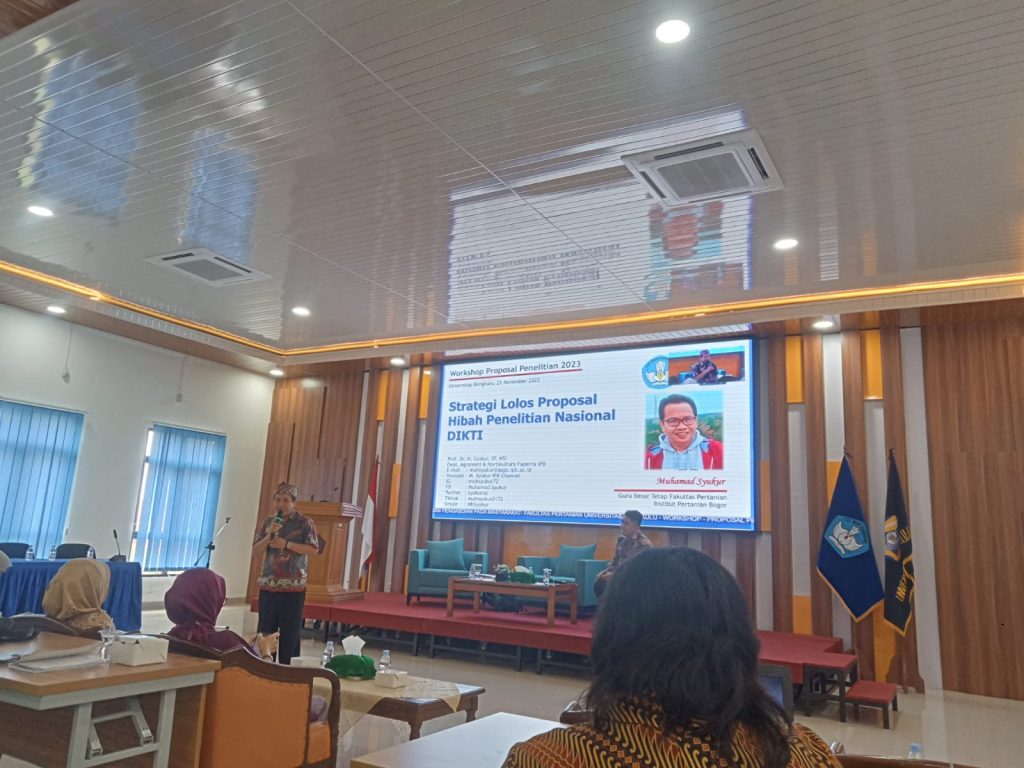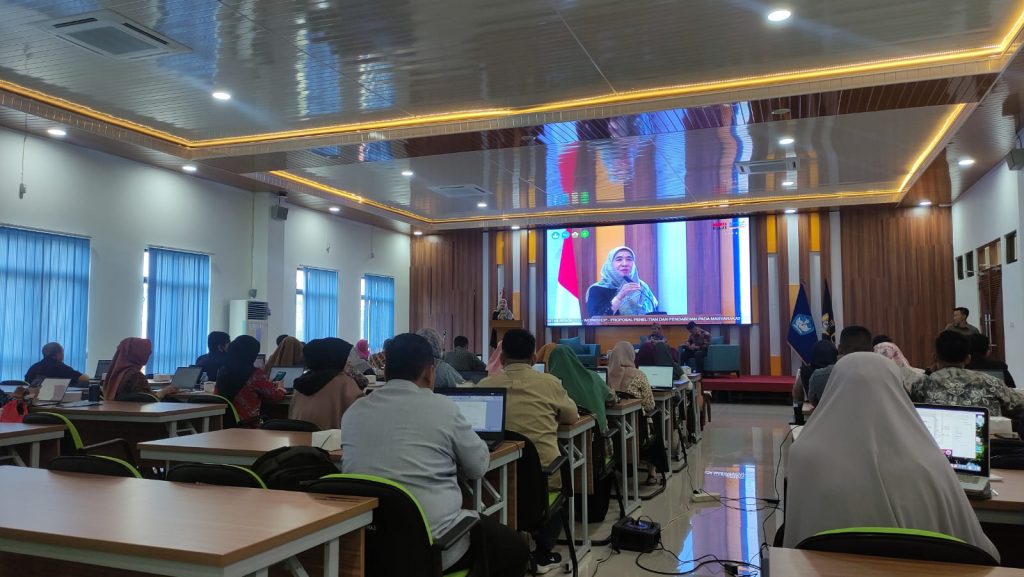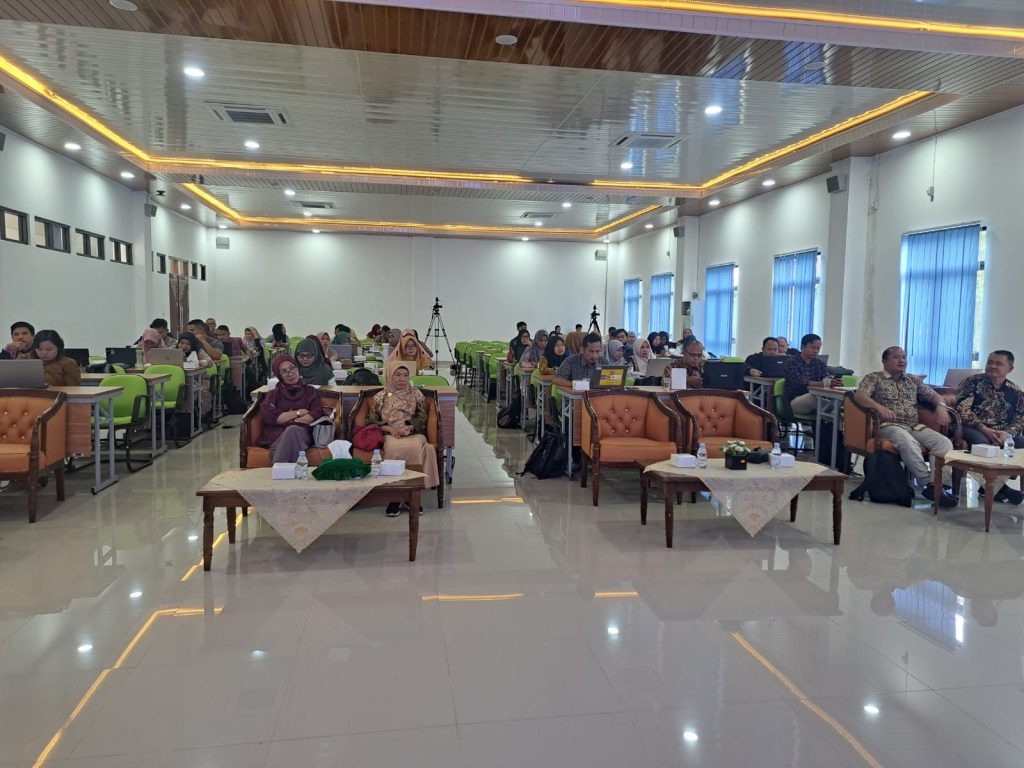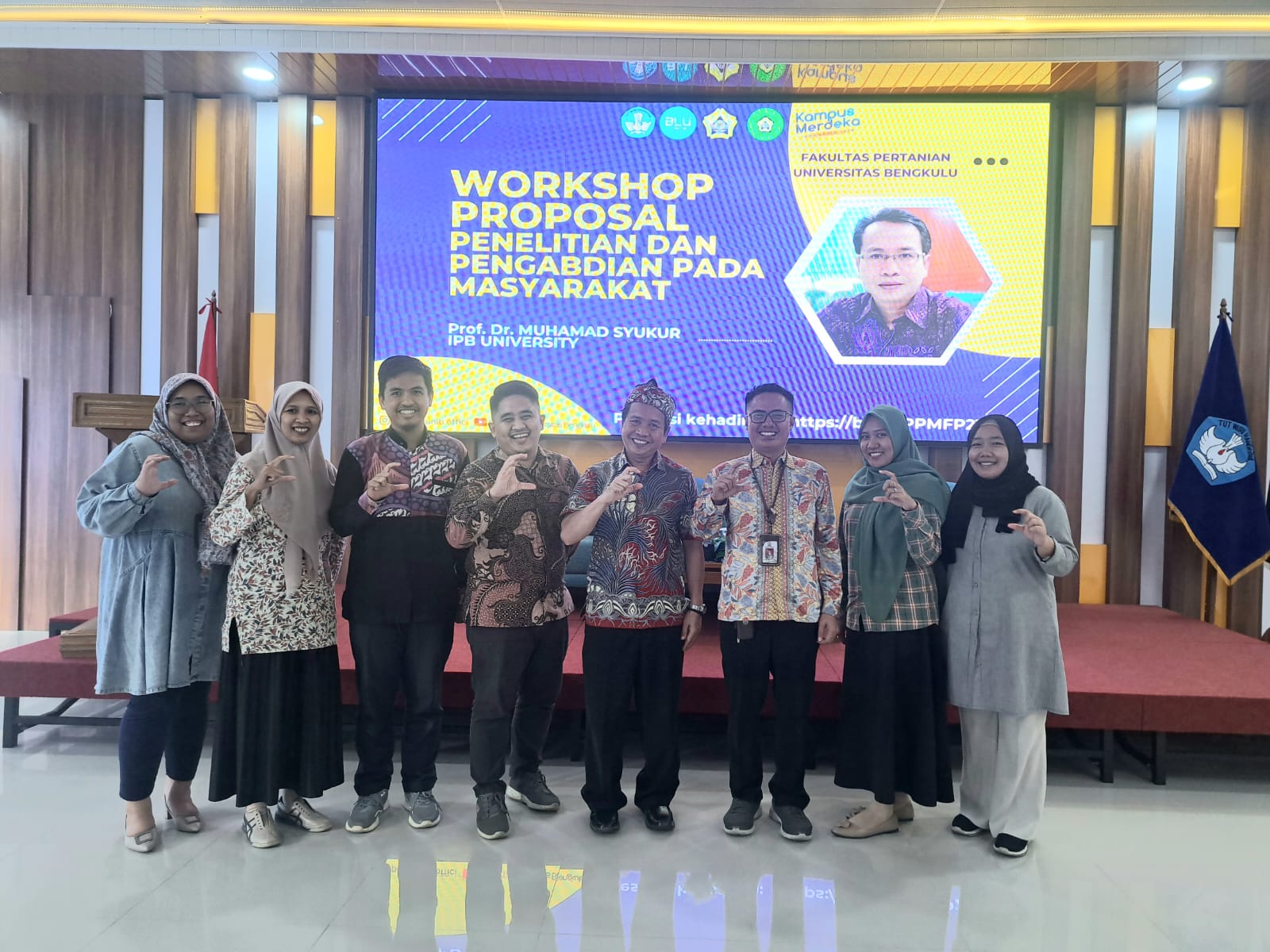
Marine science study program lecturers attended a research proposal and community service workshop
The marine science study program lecturers who attended the research proposal and community service workshop organized by the Faculty of Agriculture, Bengkulu University were Dr. Yar Johan, S.Pi, M.Si., Dr. Ali Muqsit, S.Kel., M.Si., Akbar Abdurrahman Mahfudz, S.Si., M.Sc., Maya Anggraini Fajar Utami, S.Pi., M.Si., Ana Ariasari, S.Pi., M.Sc., Nella Tri Agustini, S.Kel., M.Si, Nur Lina Maratana Nabiu, S.Pi., M.Si.
The event takes place at the Integrated Service Building (GLT) of Bengkulu University, 21st November 2023. The program begins with a report on the activities by the committee chairman, Dr. Ali Muqsit, S.Kel., M.Si. There are 80 participants, including faculty members from the Faculty of Agriculture, Bengkulu University, and other universities in Bengkulu such as Dehasen University, Bengkulu Muhammadiyah University, Prof Hazairin University, SH, and Ratu Samban University. The main speaker for this event is Prof. Muhamad Syukur from IPB University, who provides a comprehensive explanation of the intricacies of research and community service proposal preparation in the morning session, as well as coaching clinics in the afternoon.
The event continues with a speech from the Dean of the Faculty of Agriculture, Prof. Dr. Ir. Dwi Wahyuni Ganefianti, M.S., who emphasizes the importance of this activity in refreshing and recharging the motivation of the faculty members to prepare research and community service proposals as early and as well as possible to compete for research and community service grants from various sources such as DRTPM Kemendikbudristek Dikti, BRIN, LPDP, and others. She also expresses her special thanks to the main speaker, Prof. Muhamad Syukur, for attending and contributing to the event, as well as to the faculty members, both senior and junior, who are present, hoping that they will be motivated and energized to compete for research funding.
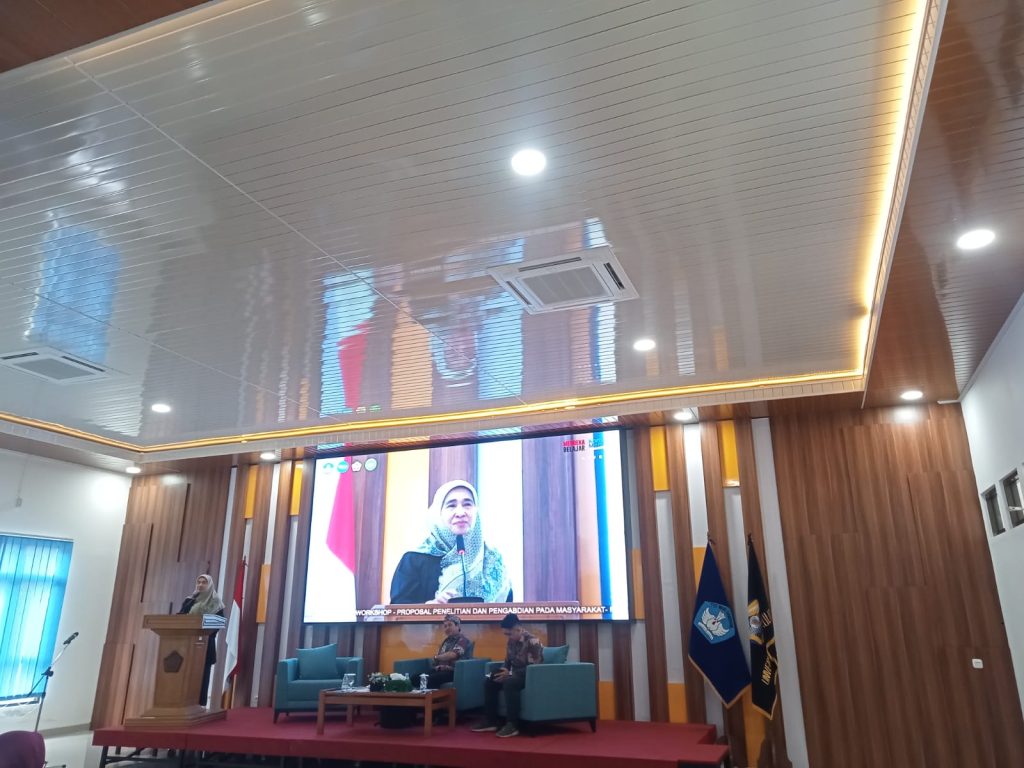
The program continues with the presentation by Prof. Muhamad Syukur. He starts by emphasizing the importance for a lecturer to have research funding, as it helps in developing knowledge, supporting expertise, and funding student research through collaboration with lecturers. Prof. Syukur also provides strategies for preparing proposals as early as possible to produce worthy and excellent proposals. Another strategy is that the proposal must promise competitive research outputs, such as Scopus-indexed journals with Q1-Q4 status. However, it is important to note that these promised outputs must be fulfilled if the proposal is accepted, as there will be monitoring and evaluation. Another strategy is the accuracy in choosing the funding scheme, whether it falls under basic research or applied research. Each scheme has specific criteria that need to be considered, so if the proposal meets the criteria for basic research, it is advisable not to choose applied research, as the chances of the proposal being rejected are high.
Research funding from Kemendikbudristek Dikti has been decreasing, making research funding more competitive due to the increasing number of proposals submitted but limited availability of funds. Therefore, the track record of the research team is highly considered by the proposal reviewers. The track record is assessed based on two aspects: publication track record, as seen from the Sinta score, and the expertise of the research team, as reflected in the research roadmap outlined in the proposal. One tip for building a track record, especially for young lecturers, is to choose a Ph.D. study, as it becomes a milestone for expertise in terms of rank and as a researcher. A lecturer’s research focus can be divided into two categories: major research and minor research. Major research is the main research to build the lecturer’s expertise, while minor research is expected to support the major research. According to Prof. Syukur, these two aspects help in building expertise through major research while still developing collaborative multidisciplinary research through minor research. As lecturers, we can build a portfolio of expertise by directly participating in major research while remaining productive in producing publications through minor research as a supporting team. These two aspects are important in building a lecturer’s track record, especially in convincing reviewers of the proposed proposal’s relevance to the expertise, with strong evidence in the form of publications and a measurable and clear research roadmap.
Prof. Syukur also provides some tips for obtaining research funding, such as submitting research proposal proposals by understanding the criteria and characteristics of the outputs. Choosing the appropriate research scheme and actively seeking information from institutions that offer research funding sources, including internal funding from universities, Kemendikbudristek Dikti, LPDP, BRIN, other ministries, local governments, industries, international institutions, and others. In this activity, Prof. Syukur also provides the criteria evaluated by reviewers along with the score descriptions for each criterion, so that the parts of the proposal that can maximize their scores can be identified.
In the closing session, a coaching clinic is conducted for one of the lecturer’s research proposals, with direct feedback from Prof. Syukur. Some points to note include the preparation of a research roadmap with a minimum time frame of 5 years, the inclusion of flowcharts in the proposal, the presentation of outcomes in the materials and methods section, and the explanation of the research team’s division of work. The methods section written in the proposal does not need to be detailed due to the limited number of characters allowed. The bibliography also needs to be considered, as it should include publications by the research team leader as evidence of the continuity of the research proposal with the researcher’s research roadmap, and the references should be dominated by recent publications from the past 5 years, as this is also a scoring criterion for the proposal.
The event concludes at 3:30 PM and is closed by the Dean of the Faculty of Agriculture, Bengkulu University, with the presentation of a memento to Prof. Muhamad Syukur. Overall, the event runs smoothly and successfully.
